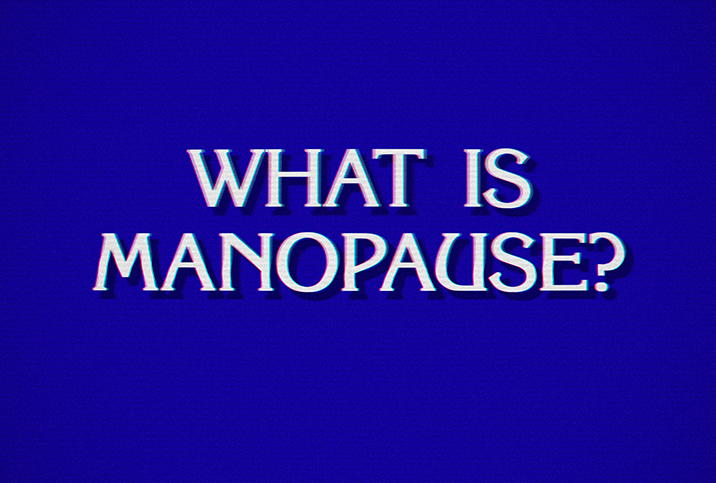What Is Andropause, aka Manopause?

Male menopause, also known as andropause or manopause, describes a series of symptoms encountered by men whose testosterone levels are falling due to aging. Most men enjoy peak testosterone levels in adolescence or early adulthood, and by the time they reach their 30s or 40s, their testosterone levels decline by about 1 percent annually.
Low testosterone, or low-T, is diagnosed when a man's testosterone level dips below 300 nanograms per deciliter. According to the Urology Care Foundation, almost 40 percent of men over the age of 45 have low-T.
Male menopause is not the male equivalent to female menopause. Men do not lose the ability to reproduce, and they don't experience the same symptoms universally. While menopause for women is a natural part of aging, some older men will never experience abnormal testosterone levels. Female menopause typically (though not always) happens in a concentrated time period, whereas dips in testosterone occur over many years.
Signs & symptoms
For men, andropause can lead to physical, psychological and sexual issues, and while each man will experience it differently—or not at all—some of the most common symptoms associated with low testosterone levels include:
- Low libido. Men with low-T often report having a lowered sex drive. Low-T can also lead to decreased semen production.
- Erectile dysfunction. Testosterone stimulates the tissues in the penis to produce nitric oxide. This begins a chemical reaction that leads to erection. If a man has low-T, he may not be able to get an erection. Many men with low-T find testosterone replacement therapy to be an effective treatment for erectile dysfunction.
- Fatigue. Men with low-T may feel tired even after a good night's sleep. Extreme fatigue and low energy are often signs of low-T.
- Irritability and mood swings. Low-T is linked to emotional issues such as irritability, anxiety, stress and depression. It can greatly affect your mental health and lead to mood swings.
- Decreased bone density. Because testosterone helps your body maintain bone density, male menopause could cause your bones to become less dense, which can lead to osteoporosis, a condition where bones become more fragile due to tissue loss.
Other potential symptoms of andropause include breast enlargement, decreased testicle size, memory loss, hot flashes, increased nervousness and hair loss. If you suspect you have symptoms of low-T or male menopause, see your doctor.
Treating male menopause
Men who suffer from physical changes associated with male menopause will receive treatment for their specific symptoms, because there is no one-size-fits-all approach. For example, a man who is overweight and has low-T will likely be advised to start an exercise routine and change his diet.
Testosterone replacement therapy might help relieve some low-T symptoms, such as fatigue, decreased libido, depression and erectile dysfunction, but it does carry potential risks and side effects. For instance, replacing testosterone could worsen prostate cancer.
Unless male menopause is severely disrupting your life, you will likely be able to manage your symptoms without medical treatment. Often, the best treatment for symptoms of andropause is altering lifestyle habits. If you are one of the men with low-T, you can possibly see improvement by doing the following:
- Eat a healthy, well-balanced diet
- Get regular vigorous exercise
- Get at least seven hours of sleep each night
- Reduce stress and anxiety
It's normal to produce less testosterone as you age, and many men find the symptoms of male menopause to be manageable. For others, severe symptoms can disrupt daily life. If this is happening to you, talk with your doctor, who can recommend ways to treat your unique symptoms and complications.


















